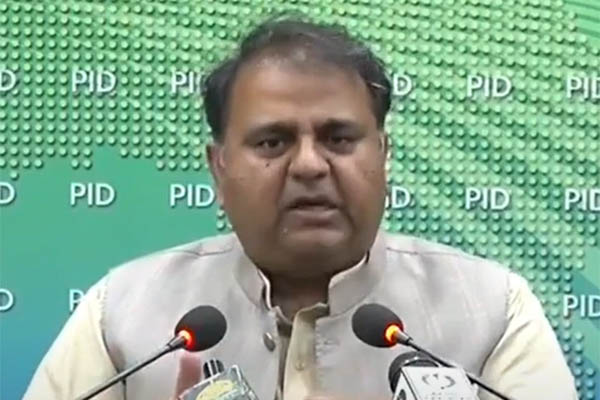
YouTube
In post-cabinet press briefing, information minister says government departments will no longer be allowed to purchase land for housing projects
The Pakistan Tehreek-e-Insaf (PTI)-led government on Tuesday reiterated its claims of essential commodities’ prices being the cheapest in the South Asian region, with Information Minister Chaudhry Fawad Hussain sharing data with journalists in a post-cabinet press briefing.
“Fuel prices in Pakistan are still the lowest as compared to those in other non-oil producing countries,” he said, adding that the cabinet had received a detailed briefing comparing the prices of commodities in Pakistan and its regional neighbors. Petrol retails for Rs. 138.73/liter in Pakistan, he said, against Rs. 258/liter in India and Rs. 180/liter in Bangladesh. He said the price of wheat flour in Pakistan was Rs. 60.9/kg against Rs. 83/kg in India and Bangladesh and around Rs. 73/kg in Afghanistan.
Similarly, he said the prices of gram pulse were Rs. 146.77/kg in Pakistan; Rs. 166/kg in India; and Rs. 224/kg in Bangladesh. The price of mash pulse, he said, was Rs. 245.84/kg in Pakistan; Rs. 244/kg in India; Rs. 334/kg in Bangladesh; and Rs. 214/kg in Afghanistan.
Of other essential food items, Fawad said the price of onions in Pakistan was Rs. 47.14/kg against Rs. 95/kg in India and Rs. 121/kg in Bangladesh. The price of chicken in Pakistan was Rs. 254.92/kg, he said, against Rs. 438/kg in India and Rs. 324/kg in Bangladesh. He said the poverty level in the countries he had listed was higher than that of Pakistan per the World Bank. He did not make mention of comparable currency exchange—1 PKR is currently equal to 0.44 INR; 0.5 Bangladeshi taka; and 0.53 Afghani.
The information minister also noted the disparity in essential commodities’ prices within Pakistan. He said a 20kg wheat flour bag was available for Rs. 1,100 in Rawalpindi, against Rs. 1,470 in Karachi. Similarly, he said the price of sugar in Rawalpindi was Rs. 90/kg, though it went up to Rs. 120.kg in Karachi. He said the price of moong pulse was Rs. 148/kg in Punjab and Rs. 196/kg in Karachi. Gram pulse price was Rs. 153/kg in Islamabad and Rs. 164/kg in Karachi.
Lashing out at the Pakistan Peoples Party-led Sindh government, he said it had failed to control the prices of commodities. He asked PPP Chairman Bilawal Bhutto-Zardari abstain from protests against the federal government and focus his energies on the Sindh government, adding that the provincial government needed to improve its governance so that its residents people could get some relief.
He said the cabinet had also discussed the support price of wheat, adding that a committee had been formed to review it. “Our issue is that if we increase support price of wheat, the rate of wheat flour also goes up, so we have to achieve a balance in this regard,” he said.
No more land
According to Fawad, the cabinet also decided to bar all federal institutions from acquiring land for housing projects and abolished all quotas in government housing schemes beyond that of its own employees. “The cabinet has decided that no federal government institution will acquire land from Islamabad residents in future,” he said, adding that the prime minister’s discretionary powers to allot plots would also be abolished.
The cabinet also decided to form a Federal Government Properties Management Authority (FGPMA) to manage the federal government’s immovable assets through public-private partnership. It approved a several appointments, including Inayat Husain as deputy governor of the State Bank of Pakistan, and granted a year’s extension to the tenure of Brig (retd.) Shuja Hassan as CEO of Pakistan Steel Mills, despite the company being defunct for several years.
Fawad noted that the government had fixed a minimum wage for laborers, but did not want to interfere with the private sector unnecessarily. “It is a responsibility of those industries of private sector which have earned record profits during the coronavirus pandemic to pass on the relief to their employees by increasing salaries,” he claimed.
On the controversy over the third amendment to the NAB ordinance, which grants the president the sole authority to remove an incumbent chairman, the information minister claimed it did not suggest the president would have to seek the prime minister’s advice, as was being reported by media.
Fawad said the cabinet had also rejected a proposal to suspending duty on the import of vintage cars for one year. He said it had also, on the request of the housing ministry, approved amendments to the Rules of Business, 1973 to have the ministries of foreign affairs and defense look after their own buildings. If either ministry wants to start any new project, he said, they would have to secure a no-objection-certificate from the housing ministry.
